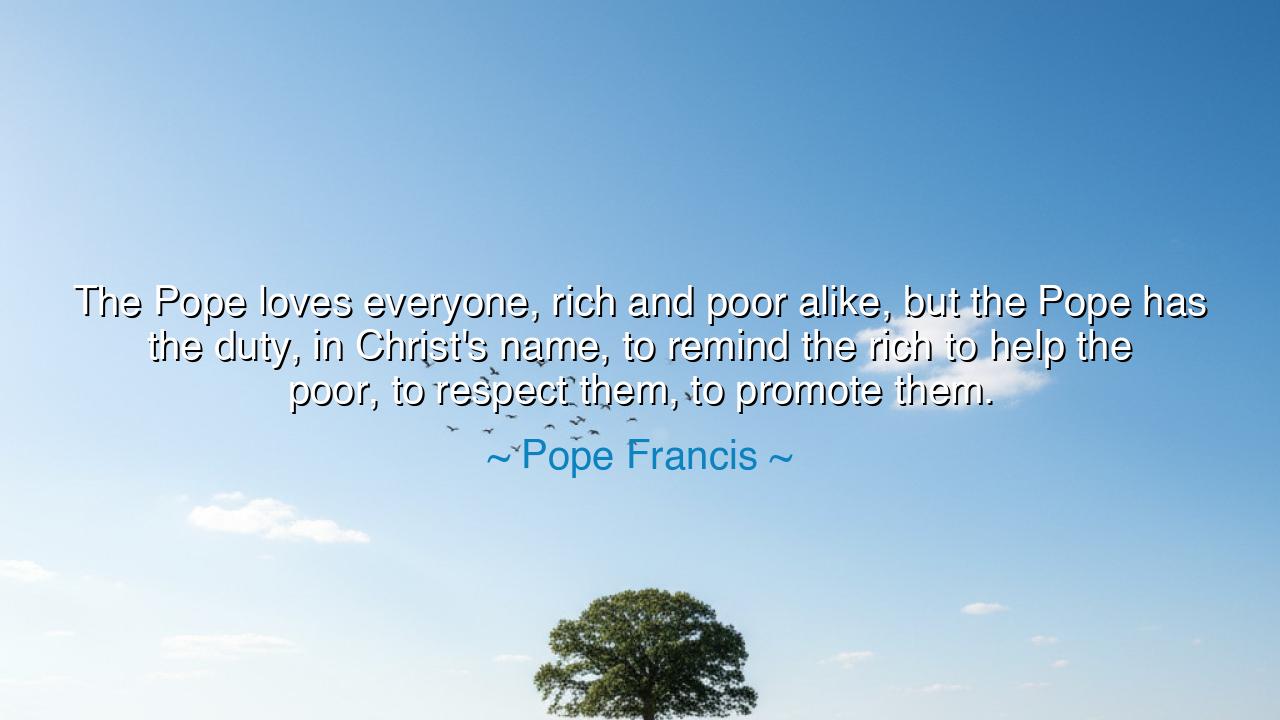
The Pope loves everyone, rich and poor alike, but the Pope has
The Pope loves everyone, rich and poor alike, but the Pope has the duty, in Christ's name, to remind the rich to help the poor, to respect them, to promote them.






The words of Pope Francis—“The Pope loves everyone, rich and poor alike, but the Pope has the duty, in Christ’s name, to remind the rich to help the poor, to respect them, to promote them.”—shine with the force of both love and duty. They are not a condemnation of wealth, nor a blind embrace of poverty, but a declaration of the divine responsibility that power and resources impose upon those who possess them. In these words, the Pope speaks not only for himself, but as a herald of the ancient commandment that those who have been blessed must become a blessing to others.
At the heart of his statement lies the sacred tension between universal love and prophetic duty. The Pope declares that he loves both rich and poor, for in Christ’s teaching, all are equal before God. Yet love is not blind—it must also be honest. To the rich he speaks with urgency, not because they are despised, but because they are entrusted with greater responsibility. Wealth is not condemned, but it is weighed, and those who carry it are called to use it for the dignity of others.
The ancients, too, knew this truth. In Rome, the philosopher Seneca wrote that wealth is not evil, but it becomes destructive when hoarded for vanity rather than shared for good. And long before him, the prophets of Israel thundered against kings and merchants who crushed the poor while adorning themselves in luxury. The voice of Pope Francis stands in this lineage, echoing Isaiah, Amos, and Jeremiah: that justice is not only a matter of prayer, but of bread, of dignity, of the lifting up of the lowly.
History gives us a powerful example in the life of St. Francis of Assisi, who abandoned riches to live among the poor. His message was not merely that poverty was holy, but that the rich must learn to respect and promote the dignity of the poor, seeing in them not burdens but brothers. Centuries later, the Pope who bears his name speaks the same truth in a world still wounded by inequality: the poor are not to be pitied from afar, but embraced, uplifted, and given the chance to flourish.
The emotional weight of Francis’s words lies in the word duty. Love is universal, but duty is particular. It falls especially upon those who hold wealth, power, or influence. To remind the rich is not an act of hatred, but of love itself—a call to prevent their souls from being ensnared by greed and their hearts from being hardened by comfort. For Christ Himself warned: “To whom much is given, much will be required.” The Pope, standing as shepherd, fulfills this obligation by raising his voice, not in anger, but in truth.
The lesson for us is clear: whether rich or poor, we must remember the sacred obligation of solidarity. If you are blessed with resources, use them to lift others. If you are without wealth, do not despair, for your dignity is equal in the eyes of God, and your voice has worth. Practically, this means acts of generosity—supporting the hungry, giving to those in need, creating opportunities where none exist. It means not only charity, but justice: building systems and communities that allow the poor to rise with dignity.
Thus, Pope Francis’s words endure as a call to action: love all, but do not be silent about responsibility. For true love does not flatter, it challenges. True compassion does not comfort the comfortable while ignoring the afflicted. And true greatness is not measured by how much we gather, but by how much we give. Let this be the teaching passed down to future generations: that the rich are not condemned, but they are commanded; and that in serving the poor, they serve not only humanity, but Christ Himself.






AAdministratorAdministrator
Welcome, honored guests. Please leave a comment, we will respond soon